The UC Merced Library actively collects materials detailing the rich cultural and environmental history of the San Joaquin Valley. Of particular interest are those documents that narrate the development and impact of human settlement of the region, and the histories of those individuals who helped transform the region into the most technologically-advanced and productive farming region in the world. Too, we look to collect materials that document the literary, cultural, and artistic history of the region, paying particular attention to those materials that trace the identities, representations, and experiences of the diverse ethnic groups that have settled in the Valley, as well as creative works that speak to the region's social, political, and environmental concerns.
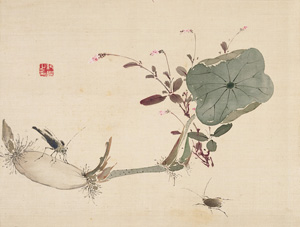
The UC Merced Library received a National Leadership Grant for Museum and Library Collaboration in 2002 from the Institute for Museum and Library Services (IMLS) to digitize works from the Clark Center for Japanese Art and Culture (formerly known as the Ruth and Sherman Lee Institute for Japanese Art) in Hanford, CA. The collection includes Japanese screen and scroll paintings, sculptures, prints, ceramics, textiles, metalwork and woven bamboo art, with works dating from the tenth century to the present day. Areas of particular emphasis within the representative collection include Buddhist sculpture and painting, screens and scrolls of the Edo Period (1615-1868), literati-style (Nanga) painting and calligraphy, modern kimono and woodblock prints, bamboo flower baskets and sculpture, and the ceramics of the contemporary Sueharu Fukami. In 2013, the Clark Center collection was transferred to the Minneapolis Institute of Arts.
Browse
Rights/Terms of Use
View the Finding Aid to the Clark Center for Japanese Art and Culture collection
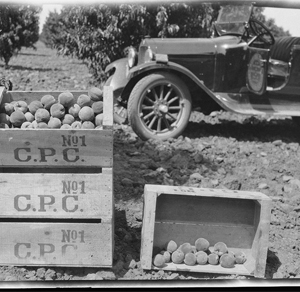
In 2016, under an agreement with the UC Division of Agriculture and Natural Resources (UCANR), the University of California, Merced Library began a project to archive, preserve, and provide access to UCCE historic records. Working with county offices, we have uncovered hundreds of linear feet of materials on crop research, agricultural production, technology, land use, socioeconomic development, 4-H and youth development, among other subjects. These materials offer a firsthand look at the changes in California communities over the past century, and at a face of California that has global impacts.
In addition to preserving and providing access to the records of county offices, we are working to surface and improve online access to publications and other information sources about California agriculture. The search tool we are developing on this site will include UCANR publications in Internet Archive, HathiTrust, as well as archival materials we have digitized.
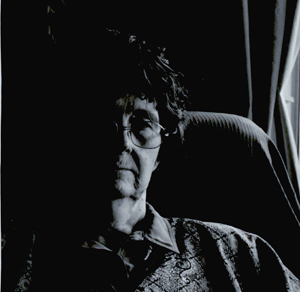
Wilma Elizabeth McDaniel was born in 1918 in Stroud, Oklahoma, and moved with her family to the Central Valley of California in 1936 as part of the Dust Bowl migration. She lived in the Central Valley, primarily in Tulare, for the remainder of her life. Known as an “Okie Folk poet,” she is the author of more than 15 collections of poetry and prose, most dealing with aspects of life in the Central Valley. She was the subject of a film documentary by Chris Simon, “Down an Old Road: the Poetic Life of Wilma Elizabeth McDaniel.” She died April 13, 2007.
This collection includes personal and professional correspondence, manuscripts, diaries, photographs, newspaper clippings and audio-visual materials documenting the life and career of Wilma Elizabeth McDaniel. Also included are publications containing poetry by Wilma McDaniel and select publications from her personal library. The audio-visual materials include interviews and scenes of Wilma McDaniel reading her poetry.
View the Wilma Elizabeth McDaniel Collection Finding Aid at the Online Archive of California.
View this collection online at Calisphere.
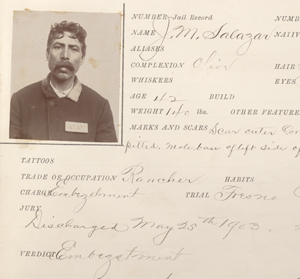
This is a partial book of mugshots, physical descriptions and sentencing history for inmates of California state prisons. Included are a handwritten list of the sheriffs of Merced County, California from 1855 to 1957 and an obituary for Sheriff Samuel Counts Cornell of Merced County, California.
View this item online at Calisphere.
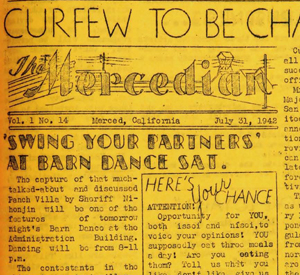
While Executive Order 9066 called for the forced internment of all persons of Japanese ancestry from the West Coast of the United States, there was no existing infrastructure in place for these Japanese-Americans. The eventual detention centers were not yet completed or were not yet in a condition to house the vast numbers of internees who needed shelter. Given this, the United States military established temporary detention centers across California, Arizona and Oregon to act as stop-over locations until the larger detention centers were habitable. There were six such temporary detention centers (otherwise known as “assembly centers”) constructed in the San Joaquin Valley in Fresno, Merced, Pinedale, Stockton, Tulare and Turlock.
This collection features the internee-produced newsletters for the temporary detention centers of Merced, Pinedale, Stockton, Tulare and Turlock.
View this collection online at Calisphere.
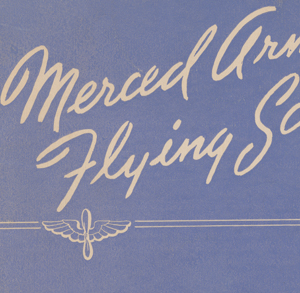
The Merced Army Flying School is one of the former names of the Castle Air Force Base, now the site of the Castle Airport Aviation and Development Center in Atwater, CA. This book, originally published during World War II, gives a glimpse into the daily life of this former Air Force training center.